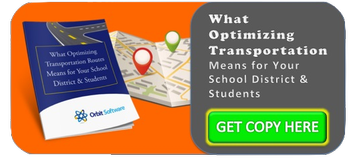How GPS Tracking Data Keeps Your Bus Fleet Running Smoothly
published on April 15, 2014 by Sonia Mastros
tracking school, tracker tracking systems, GPS Tracking
"Big Data" is a term that's being thrown around more and more in business. Rather than being a ![]() single process, "big data" represents the idea that virtually any operation - even a school district - can ultimately find significant cost savings through data collection and analysis.
single process, "big data" represents the idea that virtually any operation - even a school district - can ultimately find significant cost savings through data collection and analysis.
Of course, for schools, the benefits run deeper than that. Few industries outside of healthcare deal so directly with the health and safety of so many people. Your students' safety has to be protected from the moment they step on the bus in the morning, to when they're dropped off in the evening.
It's now common for schools to deploy bus routing software to centralize their student transportation records in a central database. However, fewer districts know that this program can centralize far more than that.
When paired with in-bus GPS systems, your routing program can become a powerful tool for managing your bus fleet. Data collection can allow you to lower daily costs, boost safety, and potentially even increase your state funding returns!
GPS Systems Bring Big Data To Buses... With Big Results
In-bus Global Positioning Systems can track the exact location of your buses, of course, but the data collection goes far beyond that. The many statistics captured by your GPS unit could include:
-
Foot-by-foot breakdowns of each bus's trip, for each day
-
Breaking times and distances
-
Overall fuel efficiency
-
Tire pressure, fluid levels, spark plug timing, and other diagnostics
-
Individually-tracked driver safety habits, such as average speeds and stopping times
-
Bus disciplinary issues, such as problematic students who may need special attention
-
Exact dates, times, and costs for all maintenance
-
Before-and-after comparisons for changes such as engine software upgrades
-
Long-term trends and statistics, over months or ever years
-
Any and all other information needed for state submissions
While not necessarily part of a GPS system, this setup could be further paired with in-bus audio or video recording, to create an even more-robust set of daily data on your bus operations.
The key takeaway here is that your bus routes no longer have to be hidden from tracking and oversight. You don't have to simply trust that your drivers are following the rules, and that your buses are being properly maintained.
You'll have the data that proves it. Or, if you don't, you'll have all the data you need to fix whatever problem might be occurring.
Increasing Bus Efficiency With GPS Systems
There are numerous ways a school district might leverage this collected data, but here are just a few suggestions:
1) Route And Fuel Optimization
When you're compiling data for multiple buses across many months, you can start to build up a highly accurate model of the real-world times and costs associated with each bus route. From there, you can quickly build new maps that optimize your routes based on the data accumulated.
This gives you a level of precision that you can't match by using maps alone when laying out routes.
2) Fewer Maintenance Surprises
Computerized tracking allows your maintenance workers to quickly identify and fix problems early, even when the "symptoms" they spot might escape everyday notice.
A drop in fuel efficiency of 10%, for example, could easily go unnoticed by a driver not paying close attention. However, to a computer system, that's a big red flag. Similar red flags can be set up for a range of minor issues, allowing your mechanics to spot small problems before they become big ones.
The result is lower maintenance costs, and higher on-road reliability.
3) Driver Reward Programs
It's fair to say that some districts receive pushback from drivers who don't like the idea of having their minute-to-minute habits tracked, even if they are, in fact, safe drivers. This can be mitigated by focusing on the proverbial carrot, rather than the stick.
While some levels of poor driving cannot be ignored, generally speaking, having rewards for safe driving will be more motivating. It gives you a way to pitch GPS systems as a good thing for your drivers, directly, if there are performance bonuses tied to demonstrable good driving.
4) Accurate State Returns
Accurate data collection leads directly to higher state returns. When your data is being tracked day-by-day, and verified with self-auditing databases, your district can be assured of the most accurate reporting possible.
That, in turn, means your district receives every cent due for their busing operations, and with fewer penalties assessed.
Keep Your Buses On-Track With GPS Systems
The benefits of GPS are substantial: Lower maintenance costs, more effective routing, higher state returns, and most importantly, safer students.
This proven and reliable technology pays off for districts. If you think it's time for a change, contact us today for a free demonstration that shows the power of big data in schools!






